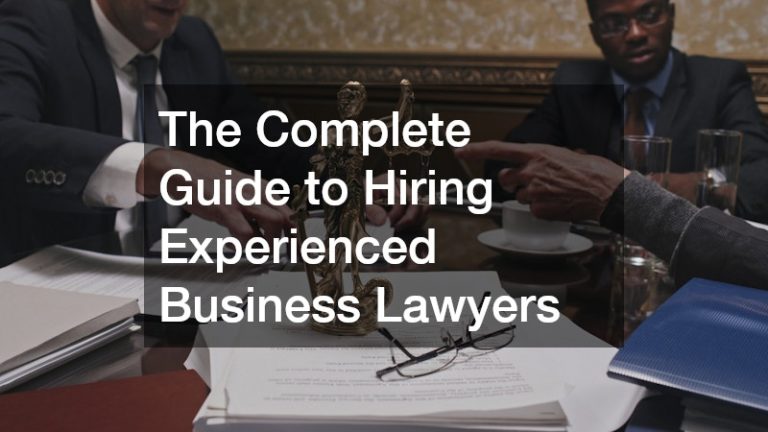In today’s complex business landscape, hiring experienced business lawyers has become essential for companies of all sizes. Whether you are running a small startup or managing a large corporation, the legal intricacies of business demand specialized knowledge. This guide aims to equip you with vital insights into the process of hiring the right business lawyer for your organization, ensuring you are well-prepared to tackle legal challenges effectively.
Understanding the Role of Business Lawyers
Business lawyers play a crucial role in providing legal guidance and support across various areas of business operations. They are adept at assisting companies with regulatory compliance, helping to navigate the complex legal frameworks that govern different industries.
These lawyers also facilitate the drafting and reviewing of contracts, ensuring that agreements are legally sound and protect the company’s interests. Furthermore, business lawyers are instrumental in conflict resolution, whether through negotiation, mediation, or litigation. By understanding the integral role of business lawyers, you can appreciate their value in safeguarding your company’s legal well-being.
Another significant aspect of a business lawyer’s role is in mergers and acquisitions. They conduct thorough due diligence to identify potential legal issues that could impact the valuation or the successful integration of two companies. Their role extends to structuring the deal, ensuring compliance with antitrust laws, and drafting transaction documents. These lawyers provide invaluable insights that help businesses make informed decisions, mitigating risks associated with such strategic initiatives. In essence, the expertise of a business lawyer can significantly impact the success of mergers and acquisitions.
The advisory aspect of business law is another fundamental area where these professionals make a difference. Business lawyers offer strategic advice to executives, helping them navigate the legal landscape and align business strategies with regulatory requirements. They keep abreast of changes in legislation that might affect the business, ensuring that the company remains compliant with the law. Additionally, business lawyers offer training and workshops to management and staff to increase awareness of legal responsibilities. This proactive approach helps prevent issues before they arise, making legal advisory an essential service that business lawyers provide.
Finding the Right Business Lawyer for Your Needs
The process of finding the right business lawyer requires careful consideration and thorough research. It is advisable to identify your specific legal needs before beginning your search, as different lawyers specialize in various areas of business law. For instance, if your company deals heavily in international business, seeking out a lawyer with expertise in international trade and compliance would be prudent. Additionally, obtaining referrals from trusted colleagues or industry associations can be an effective way to find reputable legal professionals. Initial consultations provide an opportunity to assess a lawyer’s experience, compatibility, and approach to handling your business’ legal matters.
Evaluating a potential business lawyer’s experience and track record is also imperative. Look into their history of representing companies similar to yours in size and industry, and examine any notable successes. This research can offer valuable insights into their capability to handle your legal issues effectively. Keep in mind that a lawyer with a proven track record in litigation might be the right fit for businesses facing potential disputes. On the other hand, a lawyer with a strong background in corporate governance might be more suitable for companies seeking strategic guidance rather than conflict resolution.
Equally important is considering a lawyer’s communication skills. An effective business lawyer not only provides expert legal counsel but also communicates complex legal concepts in an understandable manner. Regular and clear communication helps ensure that you remain informed about your legal situation, which fosters a strong working relationship. During initial meetings, assess whether the lawyer listens to your concerns and addresses them satisfactorily. Positive communication can greatly influence your overall experience with the lawyer, making it a critical aspect of your selection process.
Making the Most of Your Relationship with Business Lawyers
Once you have hired a business lawyer, it is essential to build and maintain a strong, productive relationship. Clearly define your expectations and the scope of work at the outset to ensure mutual understanding. Engage in regular reviews and updates to stay aligned on legal strategies and business objectives. This proactive engagement can lead to more effective legal solutions that are tailored to your company’s evolving needs. A solid professional relationship with your business lawyer can significantly contribute to your company’s success, especially in challenging legal environments.
Fostering open communication with your business lawyer can enhance the effectiveness of your collaboration. Share relevant business information and potential challenges as they arise, so your lawyer can provide timely and appropriate guidance. Active collaboration allows for the anticipation and mitigation of potential legal issues before they escalate. Your lawyer can also assist in formulating legal policies and procedures that align with your business goals, fostering a legally sound operational environment. Such an integrated approach can help your business navigate the complexities of the legal landscape with confidence.







